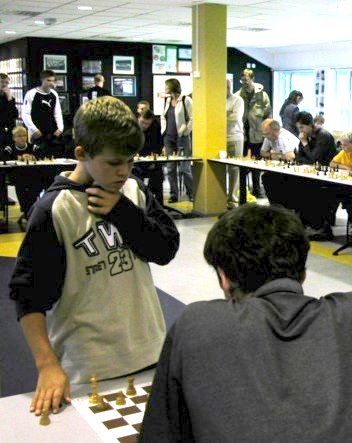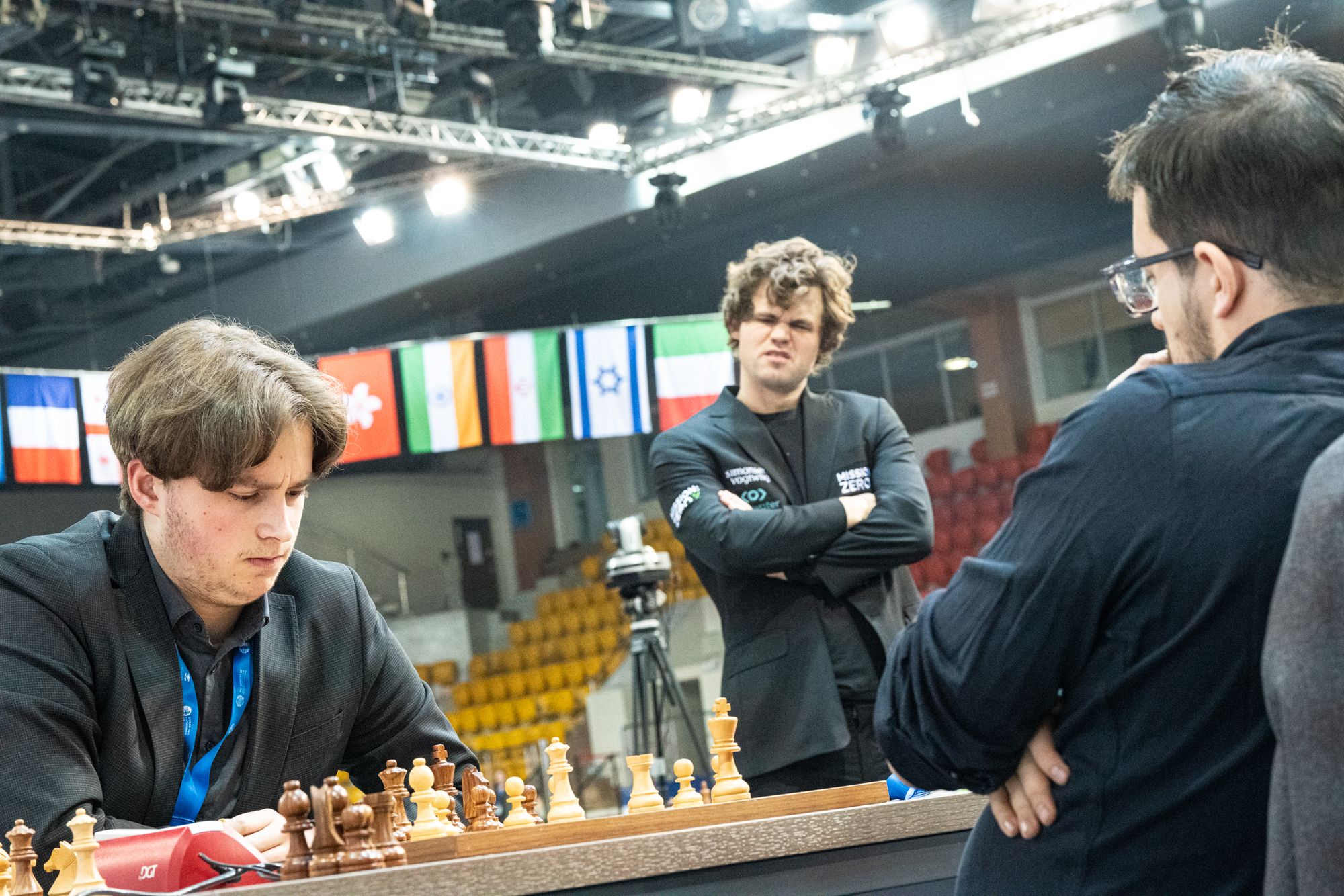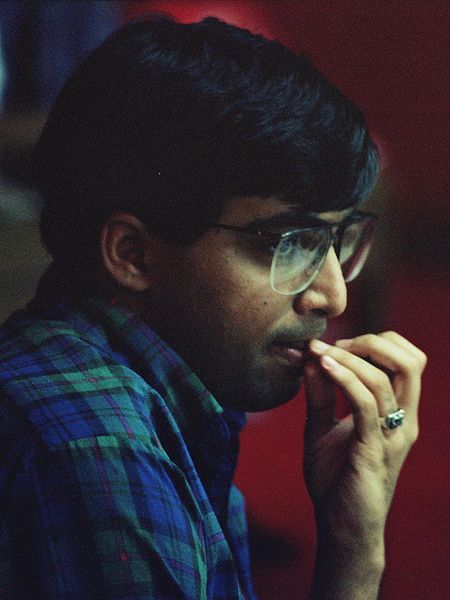
Magnus Did It!
Magnus did it. No, not winning the World Rapid. Not resigning the world title. Something even bigger, at least in my opinion (although nobody else cares that much.) In my opinion, he is finally the GOAT. Now, if you know me, I’m very slow to call Magnus the greatest ever. I don’t even like him that much, compared to some other players. I’ll take Fischer, Anand, Tal, or Kasparov any day. Honestly, I can’t really justify this. It’s just a weird bias I have, I can’t explain it. But, without more conversation, let’s dive in.

This blog will be divided up into four separate sections. First, What Did He Do? Second, How Did He Do It? Third, Top Ten: My Take. Fourth, Top Ten: My Favorites. We've got a lot of material to go through, so let's dive in!
What Did He Do?
So what did he do to earn this title? To learn this, we have to learn a little bit about his life. Magnus was born in 1990, in Norway, where he has lived his entire life. From a young age, Magnus demonstrated extraordinary mental abilities. At the age of two, he could solve 50-piece jigsaw puzzles (which isn’t that amazing, my little brother could do that.) At the age of five, he memorized the areas, population, flags, and capitals of every country in the world. There are 196 countries (depending on how you define it,) so that takes a good memory to do (although that still isn’t impossible for a normal person.) Later, he memorized areas, populations, coat-of-arms, and administrative centers for all of the Norwegian municipalities, of which there are over 400. Magnus’s father, Henrik Carlsen, who, at his peak, was himself rated 2095 FIDE. It was soon a case of the son surpassing the father, as Magnus quickly improved. He studied by playing against himself, practicing combinations, replaying games, and reading books, especially the works of GM Bent Larsen. In 2000, he won the youngest age group at the Norwegian championships with the Fischer-esque score of 10/11. In the Norwegian Junior Team Championship, he scored 3.5/5 against the country’s cream of the crop. Still nine years old, Magnus got a performance rating of 2000. While very strong, this still wasn’t unheard of. His fastest improvement was yet to come.
This is a game Magnus played in the Norwegian Championship at the young age of 9. He was rated 904!
In 2002, he placed sixth in the U12 European Chess Championship. A few weeks later, he tied for first in the World Youth Chess Championship’s U12, tying with Ian Nepomniachtchi, who won in tiebreaks. As early as 2002, these two top players had a rivalry. A year later, Carlsen finished in the top 10 for the European and World Youth Championship in the U14 section. That year he achieved the IM title in August 2003.
In 2004, Magnus won the C group in the Corus tournament at Wijk aan Zee, which is now known as Tata Steel. By the way, the Tata Steel Masters is starting tomorrow, with top players such as Magnus himself, Ding, Fabiano, So, and three young Indians: Praggnanandhaa R, Ergiaisi, and Gukesh. If you’re not excited, you’re not a real chess fan at all. But back to the topic! This gave Carlsen a GM norm. He earned his second norm a month later. After this, Magnus played in a blitz and rapid event, in which he played against two of the greatest to play the game: Anatoly Karpov and Garry Kasparov. He beat Karpov, and nearly defeated Kasparov, in the end getting a draw.
In this game, Magnus, as white, puts pressure on Kasparov, barely getting a draw.
Sadly, I could not find the PGN for the Karpov game; if one of my readers has it, please post it in the comments!
The next month, Magnus did it, getting his final GM norm. At 13 years, 4 months, and 27 days, Magnus was the second-youngest GM ever (at the time, but now he’s third, behind Karjakin and Mishra.)

Magnus’s performance continued upward, spiraling into the sky like a rocket. He achieved brilliant victory after victory, just as Sarin and Gukesh currently seem to be doing. At this point, Magnus had achieved wins against almost every super-GM currently active.
In 2008, Magnus achieved not one, but two (!!) performance ratings over 2800. The first was Wijk aan Zee, Group A. 11 out of the 14 players had ratings in the world’s top 16, and all but two had ratings of 2700+. Carlsen, aged 17, tied for first with GM Levon Aronian. His other 2800+ event was Aerosvit, in which he finished undefeated at 8/11 and achieved a 2877 performance.
His best event yet came in 2009 at the Pearl Spring tournament. It was a double round-robin with 6 super grandmasters. Carlsen finished 8/10, 2.5 points ahead of Veselin Topalov. His performance rating was 3001. According to Jeff Sonas, this was the best performance by a teenager in history. I’m not sure if Alireza beat this at the European Team Championship, but it’s still amazing. He also crossed 2800 in this tournament, making him the fifth player ever to do so. The next month, he won the world blitz championship by three whole points; an amazing performance! The next year, Magnus won Wijk aan Zee in January, Bazna Kings in June, but lost 24 rating points in the Grand Slam Masters Final, losing his number-one world spot. A few days later, he won the Pearl Spring a full point ahead of Anand. Talk about resilience! He ended the year by withdrawing from the World Championship cycle (causing surprise), coming third in the World Blitz, and winning the London Chess Classic. Honestly, I can’t go through all of his winds. It would take far more space than I have to write about all of the tournaments he’s won. But here are a few more highlights.
- In 2013, he got the highest rating ever (2861).
- Won the 2013 Candidates
- Won the first category-23 tournament
- Hit 2889 in classical, the highest rating ever
- 2014 World Rapid
- 2014 World Blitz
- First 'triple crown' of chess
- Defended his title vs. Anand
- 2015 World Rapid
- Highest rated in all three time controls
- Undefeated Tata Steel
- Defended his title vs. Karjakin
- Won 2017 World Blitz
- 2017 Speed Chess Champion
- Defended vs. Caruana
- Won the 2018 World Blitz
- Won 2018 World Rapid
- 125-game winning streak
- Defended vs. Nepomniachtchi
- 2022 World Rapid
- 2022 World Blitz
- 4 World Rapid Championships, 6 World Blitz
Anybody want to argue with that??
What more is there to win? A 2900 rating? It’s hard to think of much.
The following game is a Magnus win in which he demonstrates his typical style and technique.

How Did He Do It?
So how did Magnus get here? Training? Reading? “Innate talent”? I think the answer is a muddled concoction of these factors, with one secret ingredient.
It’s clear that Magnus Carlsen is of above average intelligence. But here’s the thing: It’s not actually that strange. Any human, if they push themselves, should be able to memorize all that information about the capitals of different nations. Now, it’s very hard, but it’s doable. I have a friend who memorized the biblical books of Matthew and Romans (I think I got that right?). Anyway, they memorized over 40 chapters of the Bible. If each chapter has about 25 verses, that’s 1000 verses. Much harder than memorizing the Norwegian municipalities or countries of the world. Here’s another example: The National Spelling Bee. If you’ve ever watched this, it’s clear that the players prepare with immense dedication. One boy spent the entire summer, each day, every day, practicing his spelling, with the help of his parents. If you put that much dedication into chess, I’d be willing to guess that you could gain several hundred rating points. I know what some of you are going to say. “Well, those are all Asians and Asians are smarter than everybody else.”
Yes, the National Spelling Bee is almost always won by an Asian kid. But there’s a reason for that. With the poverty from which many Indian and Chinese immigrants came, combined with their high expectations and value of education, Asian parents push their children to excel. (My dad is Indian, no, I’m not stereotyping.) My grandparents came from India with five dollars in their pockets, and pushed my dad to study and do his best. He did. And, because of their motivating him and his work ethic, he was able to get a scholarship to Harvard. Honestly, I don’t think there’s any evidence to say that Asians are smarter than others. They just work harder.

A 'growth mindset' is key to improvement in chess.
So what’s this ‘secret sauce’ I talked about? Well, it’s not actually that secret. It’s called a ‘growth mindset’ A lady named Joanne Calderwood wrote a book about this titled The Self-Propelled Advantage, as did the psychologist Carol Duick, who has studied this her entire life. Their argument is that there is no such thing as ‘innate talent’. That is pushing it, I agree. But I would certainly agree with them that talent is determined by how hard you work. They argue that if you believe you are ‘bad at positional play’ or ‘just never going to hit 2000’, you never will. That’s definitely true, just try it. You won’t try to get better, rather pulling yourself into the bottomless pool of discouragement.
They also say that you should attempt things that are just a little ‘too hard’ for you. Push yourself to the utmost of your ability. It will work. Have you ever tried only playing against players 200 rating points lower than you? Your rating won’t go up any time soon. But when you play against players who pose a challenge, you will be forced to think. You will be forced to play your hardest and best, pushing yourself.
Here’s another analogy. Imagine you’re a contortionist. Your muscles won’t stretch if you do the things that are easy for you. You have to do hard things, things that will stretch you (sorry for the pun). This is the secret to the success of the Navy SEALs (Sea, Air, and Land Teams). If you qualify to join them, you would have to do things that you might have thought were humanly impossible. Can you swim a mile in an icy river? Run a marathon? Do fifty pushups? Eventually, things you thought were impossible will slowly become possible for you. That is the secret sauce – a growth mindset.
Top Ten: My Take
So, now you’ve heard my argument for why Magnus is the greatest ever. But who do I think are these ‘Top Ten’? I am going to commit the egregious sin of making a list of ten greats. What do you think about this list?

Anand, my favorite chess player.
1. Magnus Carlsen: Yeah, you know why I chose him, if you read the first half of this blog.
2. Garry Kasparov: The beast of Baku was world champion for longer than Carlsen, won about every world title in existence, beat every GM of his time, and the list doesn’t stop there. Garry is an easy pick. His moral courage in involving himself in Russian politics is truly commendable. He has risked his life (Putin doesn’t really like him right now) to bring democracy to Russia.
3. Bobby Fischer: Fischer is one of the three players most non chess-players can name, along with Hans Niemann and Magnus. But chess-players love him too! Despite his later views, he was an amazing player. His games against Spassky are some of the most beautiful performances ever played in a World Championship match.
4. Jose Capablanca: Capablanca’s skill was unrivaled. His technical mastery of the game combined with his amazing positional skills put him high atop this list. As you know from my blogs, I love Capablanca.
5. Emmanuel Lasker: Lasker was world champion for 27 years. This is both a testament to his skill at chess, and to his skill at match-dodging. But, I still put him fifth on the list. He was probably the best in the world for at least 24 years; still an unduplicated feat.
6. Mikhail Botvinnik: Botvinnik won so many titles against such strong opposition that I feel I must put him on here.
7. Alexander Alekhine: Alekhine was Alekhine, meaning that he was a tactical tiger with as many tricks as a magician. His games are a never-ending source of inspiration for me, and he might just win the ‘my favorite player’ award.
8. Mikhail Tal: Yes, Tal. His resilient play throughout his entire career was simply amazing. With his brilliant sacrifices, his long career, and his colorful personality, I believe he needs to be on this list.
9. Paul Morphy: Morphy was the first unofficial world champion who can truly be said to have certainly been the best in the world. His performances beating the best of Europe are both beautiful and instructive.
10. Viswanathan Anand: Anand is on this list for so many reasons. He brought chess to India, creating a chess nation. He was the world champion many times over. He has continued to be an amazing player even after turning 50.
Top Ten: My Favorites
Now that you know who I think the greatest players ever were, you get to see my top ten favorite players.

Not all of these players have been world champion, but most have...
1. Viswanathan Anand: Anand’s influence on the Indian nation, his over the board accomplishments, his accomplishments into his middle-aged life, and his brilliant games are unparalleled. Even Kasparov did not bring chess to Russia. Fischer did not do as much as Anand. He will always be remembered as the greatest Indian player either. (And no, I’m not just biased because he’s Indian.)
2. Mikhail Tal: Tal is Tal. If you have read my other blogs (like this amazing game), you know I love his games. It’s hard to find words to describe his chess.
3. Alexander Alekhine: Alekhine was a fighter. His games, from beginning to end, never fail to delight and instruct. He was also instrumental to chess opening theory, playing and creating many innovations.
4. Garry Kasparov: Kasparov is still one of my favorite players. His fighting spirit, aggressive chess, and amazing accomplishments still have been mirrored by only two people: Magnus and Fischer.
5. Bobby Fischer: Fischer, despite his racist views, is one of my favorite chess players. He was, believe it or not, according to his friends, a very ‘nice guy’ who sadly lost it at the end of his life. His chess performances are beautiful (2 6-0 Candidate matches, anyone?) and his games are impeccable. If only...
6. Judit Polgar: Polgar is the only woman on this list. She deserves it. Her refusal to take a Women’s World Championship, her climb to the highest levels of chess, and her indomitable will to win are truly amazing.
7. Jose Raul Capablanca: Capablanca’s games are among my favorites, as you have seen throughout my blogging career. To see a few amazing Capablanca gems go to here and here.
8. Magnus Carlsen: Again, go read what I wrote earlier. Yeah, up there ↑.
9. David Bronstein: Bronstein’s games (if you haven’t seen!) are amazing lessons, full of positional play, tactics, and amazing chess. 10/10, would recommend!
10. Wesley So: So has managed, to, while still being an amazing professional player, be a good role model and example, and a ‘nice guy’ in the sometimes cutthroat world of competitive chess. Apart from that, he’s simply an amazing player.
So what do you think? How do you like my rankings? Who would you remove/add? Is Magnus the GOAT? What do you think about having a growth mindset? Tell me in the comments.
Thanks for reading!
-Luke
